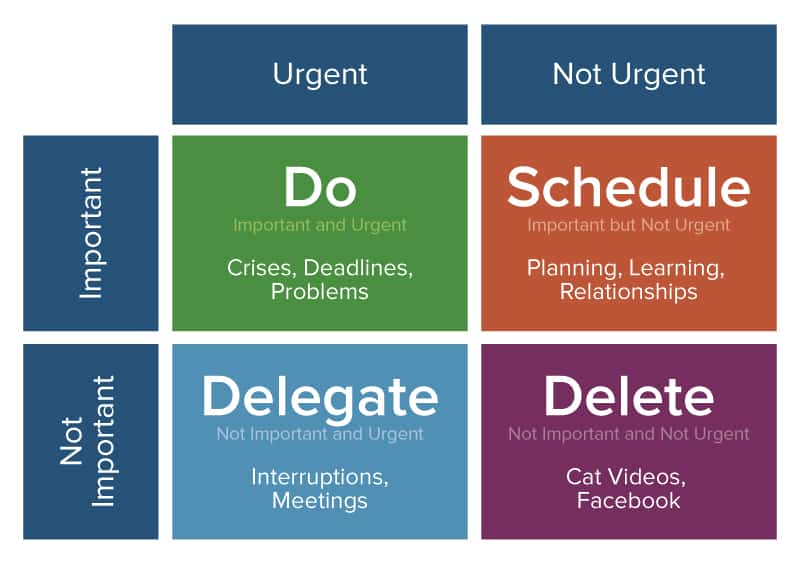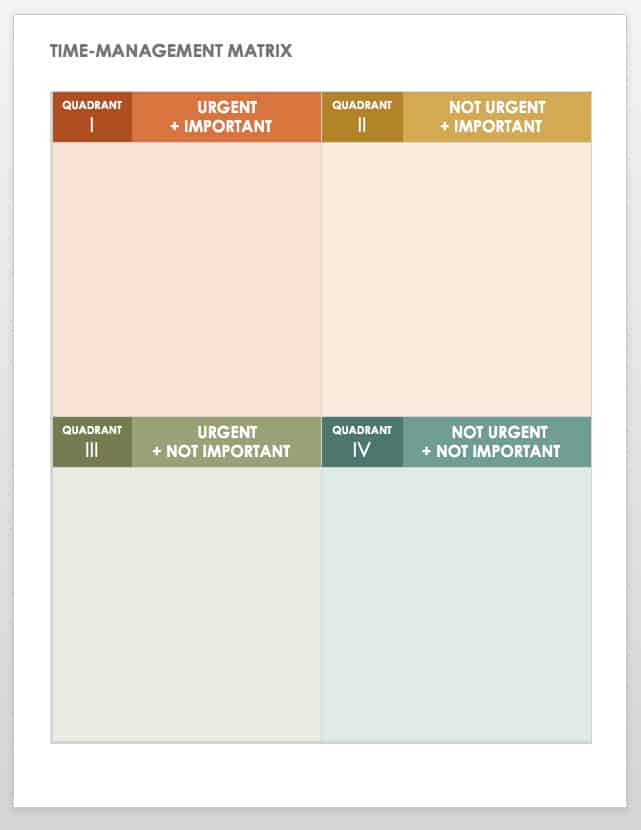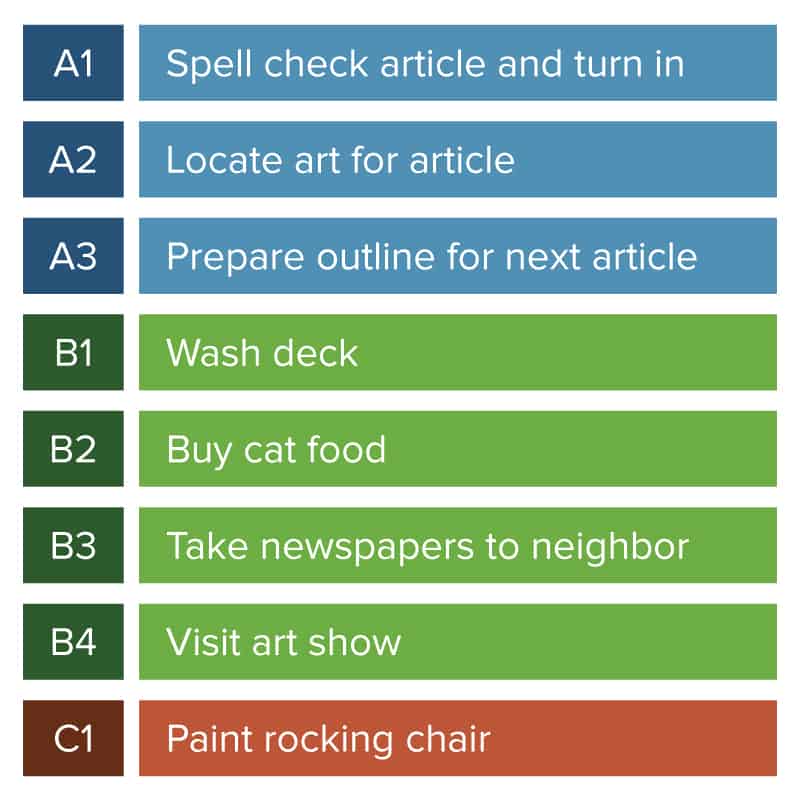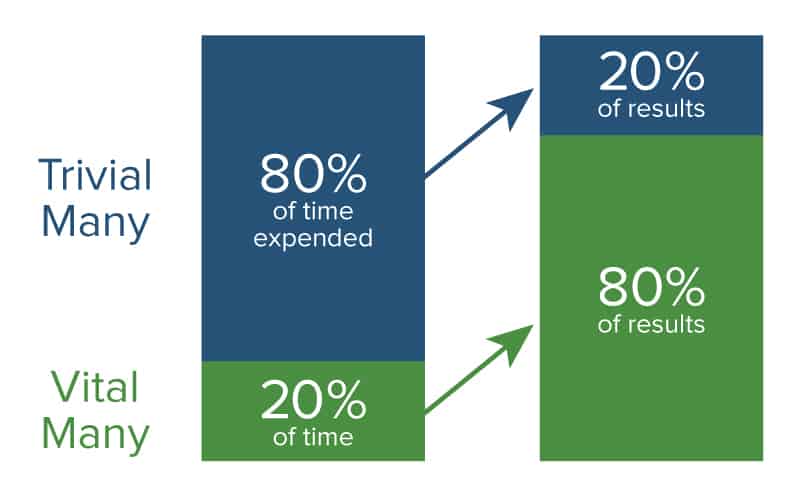What Is Time Management?
Definitions of time management usually revolve around the ability to use time productively and efficiently, especially for work, business, and school. However, productivity consultant David Allen says time management is a misnomer. “You can’t manage time anyway. Time just is,” says the inventor of the Getting Things Done method. “But you can manage yourself during time, so what you manage is your attention, your focus.”
Julie Morgenstern is a productivity expert and the New York Times best-selling author of Time Management from the Inside Out. She says that we need to understand time management differently than we currently do. “I would start by changing your perception of time,” she says. “It’s sort of an ethereal, ambiguous thing, and I teach people to think of time like a closet. It’s a limited amount of space that’s only going to fit so much. Once you get a visual metaphor of time as a closet, it becomes so much easier to manage it,” notes Morgenstern.
Related Resource:
How to Speed Up Your Decision-Making Process
What Are Good Time Management Skills?
For Morgenstern, once you view the days of your life as limited space, like a closet, you can begin to see that not everything will fit: “Even if you’re willing to work 12 hours a day, it’s still a limited amount of time, and if you are trying to do 15 hours worth of work in a 12 hour day, it’s not going to work. You’re going to feel frustrated at the end of the day. You’re going to feel that you didn’t get enough done.” Morgenstern offers the following time management tips:
- Be a Time Estimator: The solution is to become a good time estimator. “The gateway skill to good time management is when you ask not just what you need to do, but how long it will take,” notes Morgenstern. Ask that question for every request or interruption, and with that information, you can decide what will fit in your time closet. In addition, she suggests adding a how long column to your to-do list. “Once you start quantifying tasks and time, you’re in a position to tangibly manage your obligations and make much better decisions.”
- Be a Time Mapper: Morgenstern also recommends organizing your time closet by creating what she calls a time map. “A time map is a template for your week,” she says. “You take the 160 hours in the week and the 24 hours in the day and chart that out. You include what time you wake up and what time you go to sleep. Everything in between is the space you have to work with. That’s the closet of your day.”
Executives have recurring meetings. Parents have the early, daily drop-off at school. Still, Morgenstern thinks students can especially benefit from the templates. For their time map, students add their classes as known quantities. They might decide that Friday night is always their social time, but that Saturday is the day to do errands. “You create a structure,” adds Morgenstern. “That time budget is a template, so you fill in the blanks.” Your to-do list of errands is applied to the Saturday slot. Your assignments may change, but you know you’ll be studying every night between 6pm and 9pm. “The routine of always knowing when something happens really fuels efficiency,” she emphasizes.
Routine can also help you spot work/life imbalances. “It goes back to the closet image,” Morgenstern says. “If your jeans go here, your sweaters go here, your t-shirts go here, and your belts go here, it’s easy to see if you have too much or too little of something. You can see how in balance you are. But if everything is scattered, you can’t see if you have too many jeans or not. Similarly, regarding your day, if you group similar tasks, you’re more efficient and you can see how you’re doing in terms of your life. If one category is monopolizing your life at the expense of others, you need to find ways to shrink this down to make room for something else.”
- 4-Ds: Delete, Delay, Diminish, Delegate: Morgenstern finds that when you really look at how long things take and when you become a good time estimator, things always take longer than you have time for. That’s when the 4-Ds can help. Use them to streamline a task or your entire to-do list, for work or at home.
- Delete: Ask yourself if the return on investment in a project is worthwhile. Maybe it duplicates work already done.
- Delay: Does it have to be done now? Can it be eked out over time or started at a later date?
- Diminish: Can you limit the scope? Instead of taking 12 hours to do a report, would a one-hour conference call suffice?
- Delegate: Can somebody else do it, and better? Is it perhaps somebody else’s job in the first place?
More Tried and True Time Management Skills
You might know these skills already. As Morgenstern suggests, “Tackle one skill at a time, one tool at time, and one strategy at a time. Don’t think that by reading one article and tackling one strategy your life is going to run perfectly.”
- Set SMART goals. To get somewhere, you need to know where you’re going. You also need to be able to measure your progress. SMART goals are specific, measurable, and realistic, so you have a greater chance of achieving them and knowing when you’re going to get there.
- Make to-do lists. Lists help you to remember things, which seems like an obvious advantage. But they also free your mind so you can focus on bigger, more important concepts or problems without carrying all that baggage around.
As organization and time management author David Allen says, “Your mind is for having ideas, not holding them.”
Have you ever lain awake after midnight trying to remember everything you need to do during the next week? It’s amazing how quickly and comfortably you go sleep after you’ve gotten up and made a list. A list is a stress reducer, as you see the big picture when your responsibilities are written down. Lists also provide a record of your efforts. And, when a task is done, you have the reward of checking items off as done. Here are some additional time management tactics to help you use your time effectively:
- Prioritize: You may need to complete goals in a certain order, and this is especially true for tasks. Some tasks need to be accomplished immediately, others not. Learning the difference between urgent and important items may help. (We’ll delve deeper into this later on.)
- Chunk Activities: Break a big job into smaller tasks. When Theodore Melfi directed the movie Hidden Figures, he didn’t just go to the set and film the whole thing in one go. He and his team blocked each scene and filmed shots one at a time. Chunking can help with the next skill.
- Avoid Procrastination: Procrastination often arises from fear of failure and being overwhelmed. Remember, your fear is probably worse than the thing you need to do. If it is that bad, a solution is out there. As Colonel Hal Moore said, “There’s always one more thing you can do to influence any situation in your favor — and after that, there’s one more thing, and after that there’s one more thing, etc. The more you do, the more opportunities arise.”
- Consider Why You Procrastinate: If you do procrastinate, don’t shy away from the problem out of shame. Ask yourself why you’re doing it. Morgenstern suggests that for activities you’re avoiding or that seem to consume too much time, time yourself on three occasions while completing that same task, and then check the average time. Timing may help offer insights about problems concerning the activity.
- Persevere: This skill is a particularly important one for young people to learn. Of course, in the context of a volatile economy and uncertain job security, it’s important to remember at any age. There are good and bad days, and mistakes are opportunities to learn. To put a bright spin on the ancient concept of the wheel of fortune, your luck will come around.
- Understand the Difference Between Efficiency and Effectiveness: As the management guru Peter Drucker said, “Efficiency is doing things right; effectiveness is doing the right things.” Let that be a lesson to people who always need to jump in. Before plowing ahead, think about something for five minutes to determine if it’s worthwhile.
- Use Organizational and Planning Tools: Your phone can remind you about appointments, so you don’t have to worry about keeping every little meeting. Digitizing your files can help clear your desk, as well as all the other surfaces of your home and office. Use technology - it can help.
- Celebrate Small Achievements: When you’ve reached a milestone or goal, reward yourself.
Why Use Time Management?
Time management skills can help you balance conflicting demands on your time. Learning to better manage your time can help you:
- Relieve stress.
- Maximize your accomplishments.
- Track the tasks that lead to your goals.
- Be more organized.
Think Globally: Time Management Tips for Remote Teams
e live in a global world with remote work teams, and even remote friends and families. Office hours are essentially 24/7, so it’s easy to get caught up in the frenzy and leave the phone on, even on weekends and vacations.
Julie Morgenstern recognizes this: “I think a person’s impulse is to try to do as much as they can in an environment like that. Like a kid in a candy shop. ‘There’s so much happening, and I should try to keep up and do as much as I can.’” Morgenstern recommends you reframe your thinking.
And what about those time differences? Say you’re on a deadline for a project. Your translator in the UK needs to upload the French translations, so you, in San Francisco, can publish them when you come in at 8 a.m. Pacific Time. However, she’s working her way through languages alphabetically and is still working on Chinese translations. For situations like this, Morgenstern says you need to establish a dialogue about time. “Without it, people are just not aware. They’re not thinking about it. If you assume they’re going to figure it out, that’s misguided. They don’t know. They probably don’t even know how long their own stuff takes,” she stresses.
Crucial Conversations About Time Management Techniques
According to Morgenstern, conversations about time management need to happen in many situations, not just with remote teams. “I think talking about time is the other thing people don’t do. They just suck it up, and there’s no dialogue around time. People just say ok and try to figure out where they’re going to find the time, or they stay up late and suffer in silence,” she points out.
A key tool she recommends is asking not only what you should do, but also how long it will take. And just asking those questions can also reveal misunderstandings. “If someone says, ‘I think that will take me five hours,’ ask how they’re approaching it. Ask them to talk you through it, and then you can say, ‘Oh, wait a minute. I wasn’t expecting you to do a 40-page summary. All I was expecting was a five-bullet email,’” she explains. “Just having those conversations saves so many people so much time.”
What Are the Techniques of Time Management?
Techniques are collections of skills. The power of employing techniques is that an expert has already perfected the steps for you. Therefore, all you have to do is apply them. The following are some of the current, major time management techniques.
- Pomodoro: Created by software developer Francesco Cirillo, pomodoro is a time management technique named for the Italian word for tomato. Cirillo’s inspiration for the method came from the tomato timer he used to help him focus while studying at university. You set a timer (not necessarily a tomato-shaped one) for 25 minutes and work on a single task or project. When the timer goes off, you’ve accomplished one pomodoro. Take a brief break of about two minutes, during which you can look up that recipe or play with the dog. Set the timer again. Complete four pomodoros. Then take a longer break.
- 18 Minutes: This technique comes from the book 18 Minutes: Find Your Focus, Master Distraction, and Get the Right Things Done, written by Peter Bregman. In essence, it works like this:
- Each morning, spend five minutes deciding what you need to do that day and what will help you to feel that you’ve accomplished something.
- Each hour, spend one minute considering if you’ve used the hour productively.
- Each evening, spend five minutes to assess what you’ve learned and accomplished during that day.
- Domino Reaction: Promoted by author Amit Offir in his book 24/8 - The Secret for Being Mega-Effective by Achieving More in Less Time, this technique posits that, over time, some activities have a greater cumulative payback than others. The most commonly cited example of a domino reaction activity is writing a book, which presumably continues to generate revenue even after its completion. For instance, the book may garner you interviews or invitations to work on other projects.
- Getting Things Done: Getting Things Done (GTD) is a methodology for organization and time management developed by David Allen and discussed in his 2001 book of the same title. Allen himself describes it as “a set of best practices that allows you to get more space in your head, so you have more bandwidth, attention, and ability to focus on the most meaningful stuff.”
The GTD system has five basic steps:
- Collect: Gather all the sticky notes and bills littering your space, and write down any appointments, ideas, or tasks.
- Process: 400 times a day, for several seconds, review these items. Work through each in the order in which they appear in your list or inbox to decide what’s needed. Can you complete the task? Can you delegate it? Do you have to wait to finish it, or can you wait to finish it?
- Organize: Toss it, file it, or add it to a calendar or to-do list.
- Review: Review your inbox, your calendar, your to-do list, your office, or what’s on your mind as often as you need to in order to keep your mind clear and stress-free.
- Do: Start or finish your tasks. Contrary to other tips, which advise doing the difficult or unpleasant tasks first, GTD suggests you try to do things in context, as they arise.
To Allen, the beauty of the system is that you can start wherever you are, even if you’re sitting in a forest of paper piles. “All you need to do is pick up something out of the pile and say, What the hell is this? and What’s the next action I need to take on this? A lot of systems start by saying you should set goals, get organized, set priorities, have a purpose, etc., and most people say, Yeah, yeah, yeah, I should. But, our day-to-day and hour-to-hour life is out of our control, and if that’s out of our control, trying to set goals or set a bigger vision is just going to blow more fuses for us.”
- Timeboxing: With this technique, you set a specific start date and deadline, thus limiting the time to work on a task or project. Use this on your own or with teams in the workplace. Scrum, a framework for managing projects that stresses teamwork, accountability, and incremental progress toward a well-defined goal, employs various timeboxes, including the sprint, which is a timebox of one month or shorter duration.
- POSEC: This time management technique often appears in business guides and is a riff on Abraham Maslow’s hierarchy of human needs. POSEC helps you reach your goals (self-actualization in Maslow-speak) by recommending that you chunk. If you work through the POSEC steps correctly, you scale Maslow’s hierarchy to attain personal happiness. The POSEC steps are as follows:
- Prioritize and define your goals and tasks, and order them in terms of the most important and achievable in the time allotted.
- Organize and figure out the best way to accomplish your everyday tasks, such as feeding the cat or getting groceries.
- Streamline and simplify the things you have to do but don’t like to do, so you’ll have more time and energy for other things.
- Economize and reduce the things that are not urgent.
- Contribute. Achieving your tasks and goals should give you the opportunity to give back to society. You can also consider this step the delayed payoff from certain activities.
- COPE Technique: American productivity expert Peggy Duncan has developed the cope technique, which includes the following steps:
- Clear: Get clear on your goals.
- Organized: Organize everything you must do.
- Productive: Prioritize your tasks and goals.
- Efficient: Work on finishing the priority items.
- Triage Technique: Invented during the Napoleonic wars to assign degrees of urgency to soldiers’ illnesses, you can apply the basic concept to any organization and time management question. Determine which of these three categories your tasks fall under:
- Things that are important but not urgent. Planning for your toddler’s post-secondary education is important, but it’s not yet urgent.
- Things that are a waste of time. For example, learning to tile and buying all the supplies for one 20-square-foot bathroom floor may not be worth the effort, if you don’t plan to tile another floor again in your life.
- Things that need immediate action. If you’re a student taking your SAT exam in a week, you need to study now. If you’re a store manager, and a customer and a clerk are having a heated skirmish, you need to defuse the situation immediately.
- Triage Technique: Invented during the Napoleonic wars to assign degrees of urgency to soldiers’ illnesses, you can apply the basic concept to any organization and time management question. Determine which of these three categories your tasks fall under:
- Things that are important but not urgent. Planning for your toddler’s post-secondary education is important, but it’s not yet urgent.
- Things that are a waste of time. For example, learning to tile and buying all the supplies for one 20-square-foot bathroom floor may not be worth the effort, if you don’t plan to tile another floor again in your life.
- Things that need immediate action. If you’re a student taking your SAT exam in a week, you need to study now. If you’re a store manager, and a customer and a clerk are having a heated skirmish, you need to defuse the situation immediately.
- Eisenhower Method or Covey’s Time Management Grid: We can trace this method back to Dwight Eisenhower, Supreme Commander of the Allied Expeditionary Forces in World War II and 34th president of the United States. It was inspired by his comment that, “What is important is seldom urgent, and what is urgent is seldom important.” Organizational guru Stephen Covey adapted the method in his book The Seven Habits of Highly Effective People. Covey coined his version of the technique the time management grid. The grid is a box containing four quadrants:
- Urgent and Important: Do these tasks first. An example is running to catch the dog if it runs into the street.
- Important but Not Urgent: Put these on a calendar to do later. These include things like reading a book for professional development or moving the planters to scrub the deck.
- Urgent but Not Important: These items include interruptions, such as reading unsolicited email instead of turning off your phone or computer.
- Not Urgent and Not Important: These items yield the least direct value and distract you from your priorities.
People often find that their activities fall into quadrants 1 and 3. Try to focus on quadrant 2 activities. Although these activities are often easy to achieve, they can offer significant benefits to all parts of your life. To use the time management grid or matrix, add your to-do list items to each box as you deem appropriate. You can also use the matrix as an analysis tool by making six copies and using one for each day to track how you spend time. In the sixth copy, add up the week’s activities for each quadrant, and estimate what percentage of time you spent on each. We’ve included templates of the Eisenhower box that you can download, print, and use to track your own time usage.
Download Time Management Matrix Template
- A-B-C Method: Managers originally used the ABC method for supply chain management to determine which stock returned the most value for effort. For the purpose of time management, you apply the technique by grouping your tasks into categories A, B, and C. Similar to the Eisenhower method, each category represents a different priority level:
- A = important and urgent
- B = important but not urgent
- C = not important and not urgent
Take your to-do list and assign each of your tasks to the appropriate category. Now, within each group, prioritize each task. For example, Task A1 should be done first and so on.
- Pareto Analysis (of Time versus Result): People sometimes refer to this as the 80-20 principle. Often pejoratively applied to human activities, such as working and volunteering, the Pareto analysis describes the perceived phenomenon in which 20 percent of the people are said to produce 80 percent of the results, while the other 80 percent of the people sit and talk about results and judge others’ actions. You can apply this method thoughtfully and without judgement in your personal life or with your work team. Consider what activities or processes produce the most results. That should form the basis of your efforts.
- How the ABC and Pareto Methods Work Together: Look at your A group and determine which tasks you’ll complete the fastest. Then do those. You can do them in 20 percent of your time.
What Are the Top Tips for Time Management?
No matter what you do with your life, most tips for organizing your time are relevant. Whether you’re a student, a caregiver, an executive, or a worker, these tips can help:
- Do a time log for a week to determine where you spend your time. Be honest. Look at the time you waste.
- Have higher-level and intermediate goals. How can you figure out what you need to do, if you don’t know what you want to accomplish?
- Keep a to-do list. List the tasks needed to accomplish those goals.
- Curate your to-do list daily. Every morning, create a new list of what needs to be done that day. At the end of the day, think about what you need to do tomorrow, and then make that list.
- Use one of the time management techniques to organize all of your lists and establish your priorities. You might try adding the things you don’t want to do first. Also, add one likable activity to that set of unlikable activities.
- Learn to say no. If you have to focus, focus. If you can’t take on another project without the quality suffering, then don’t. If you don’t feel like you should go to a dinner party, a fundraiser, or out for a drink with friends, just don’t.
- Eliminate distractions. If you need to finish something, lock yourself in your office, and ignore your email. Also consider any frequent daily interruptions and how you might avoid them.
- Delegate. This applies to small business owners, managers, and maybe even cohabitants.
- Consider your health. Take breaks, get rest, and don’t work on your holidays or every weekend. Have some periods of complete downtime. And sleep!
- Work in blocks of similar activities.
- Don’t multitask. Extensive studies show that the vast majority of people aren’t good at it. If it’s an absolute must though, and you’re one of the few who can do it effectively, then do it.
- Use waiting time during your commute or in a doctor’s office to get things done. Review class notes, make your grocery list, etc.
- Use tools to help you schedule and organize.
- Don’t procrastinate, but if you do, ask yourself why.
Time Management Tips for Your Job Search
While you can apply general time management tips to any part of your life, searching for a job can be particularly taxing and demoralizing, which is why managing your time effectively is critical. Here are some important time management tips to assist you in your job search:
- Schedule time for researching companies and reviewing interview questions. If you truly want another job, blocking off this time is vital, whether you already have a job, or you’re currently unemployed. Don’t let the hours and days get away from you just because no one is structuring your time.
- Use tools to help you stay organized and on track. Don’t forget appointment times or lose important contact information by using scraps of paper. Keep all your job search information in one place, like a notebook or an online task management program.
- Chunk goals into smaller tasks. A job search can feel overwhelming. Just remember, one task at a time. And don’t get discouraged by news about the weak job market — you only need one.
- Learn to say no. If you need to prepare for an interview, don’t agree to bake three dozen cookies for the preschool party.
- Delegate. Maybe it’s time for the kids to learn to pack their own (nutritious) lunches or for your neighbor to chauffeur the soccer team.
- Ask how long interviews are expected to last. You need to mentally prepare for marathon, four-hour sessions, and you also have to schedule the rest of your life. Moreover, asking this type of question makes you look like a good time manager.
Laura Rotter is a talent acquisition and benefits manager. She says that as a job candidate, you can demonstrate your time management skills before you even appear for your first interview.
What about your resume? How can you demonstrate that you budget your time well? Rotter says that HR professionals tend to be wary of self-descriptions. (So much for the ubiquitous keen self-starter.) “A clean, tight resume effectively conveys the message that you’re a person with a good system for staying on top of things” advises Rotter.
How Can I Learn Time Management Skills and Techniques?
You’ve read the tips and techniques. Maybe you’ve even read 20 other articles about time management. So, how can you incorporate the benefits into your everyday life?
Allen sees time management as the skill of choosing better priorities: “That’s a lifelong process. That’s a constant challenge. As a matter of fact, the better you get, the better you better get, because you’re then going to walk into the stress of opportunity. You’re going to have so many choices of cool things you could be doing, that that choice in itself will cause a lot of the stress.”
Morgenstern says, “What I don’t see written about enough is that time management is a life skill that takes a lifetime to master. Nobody is a master time manager.” She says that good time management won’t ensure that you always spend time well. “I think good time management is about having a toolkit of techniques and strategies that you rely on to both plan your time as proactively and mindfully as possible, and to recover when life throws you curveballs.”
We also need to stop judging ourselves so harshly about what we do with our time. “Time management is a very personal subject because how we spend our time is how we spend our lives,” Morgenstern continues. “And in my experience, people feel guilty. They beat themselves up. They call themselves lazy or procrastinators or losers. Get out of the beating-yourself-up game. Time management is a hard skill, but you can sharpen it over time,” she concludes.
Ultimately, time management is an ongoing process. It’s daily, monthly, even yearly. You need to regularly evaluate whether you’re spending your time wisely and in ways that reward you and make you happy. Make an appointment with yourself. You deserve it.
A More Effective Way to Manage Your Time with Smartsheet
Empower your people to go above and beyond with a flexible platform designed to match the needs of your team — and adapt as those needs change.
The Smartsheet platform makes it easy to plan, capture, manage, and report on work from anywhere, helping your team be more effective and get more done. Report on key metrics and get real-time visibility into work as it happens with roll-up reports, dashboards, and automated workflows built to keep your team connected and informed.
When teams have clarity into the work getting done, there’s no telling how much more they can accomplish in the same amount of time. Try Smartsheet for free, today.






